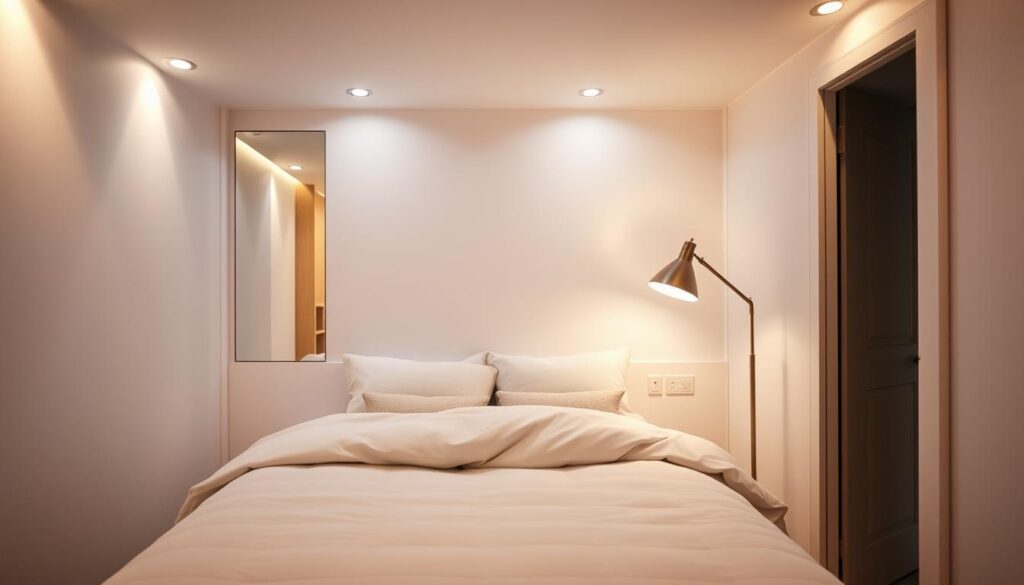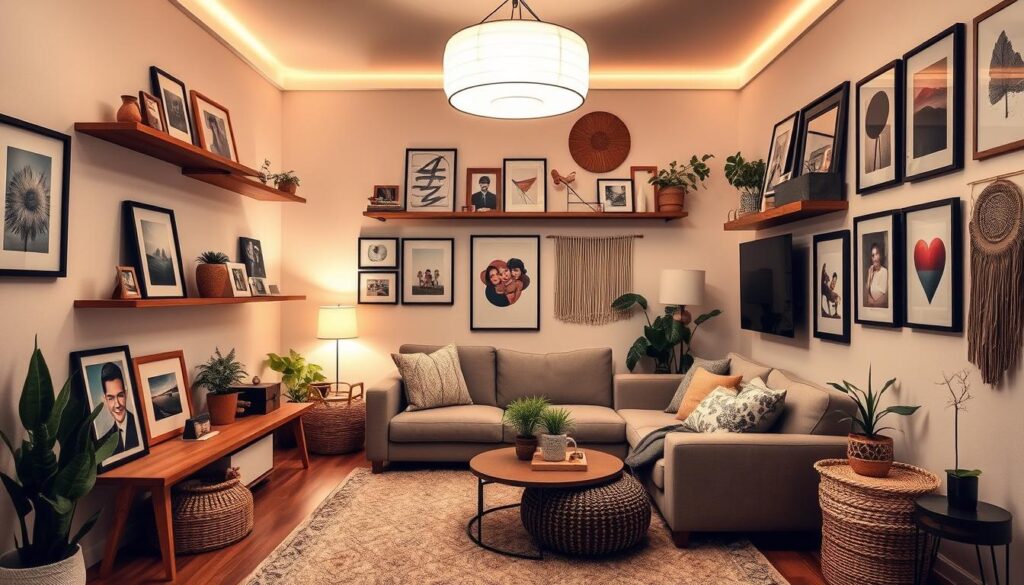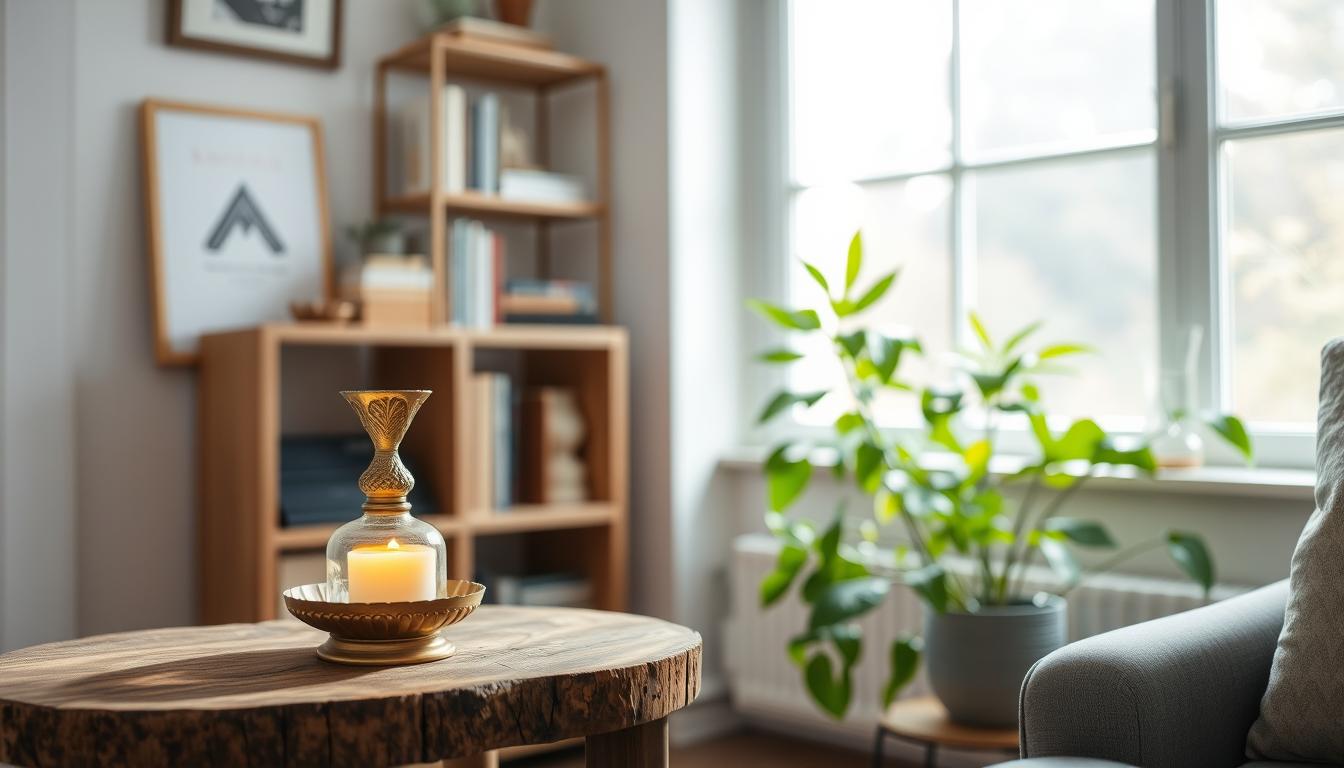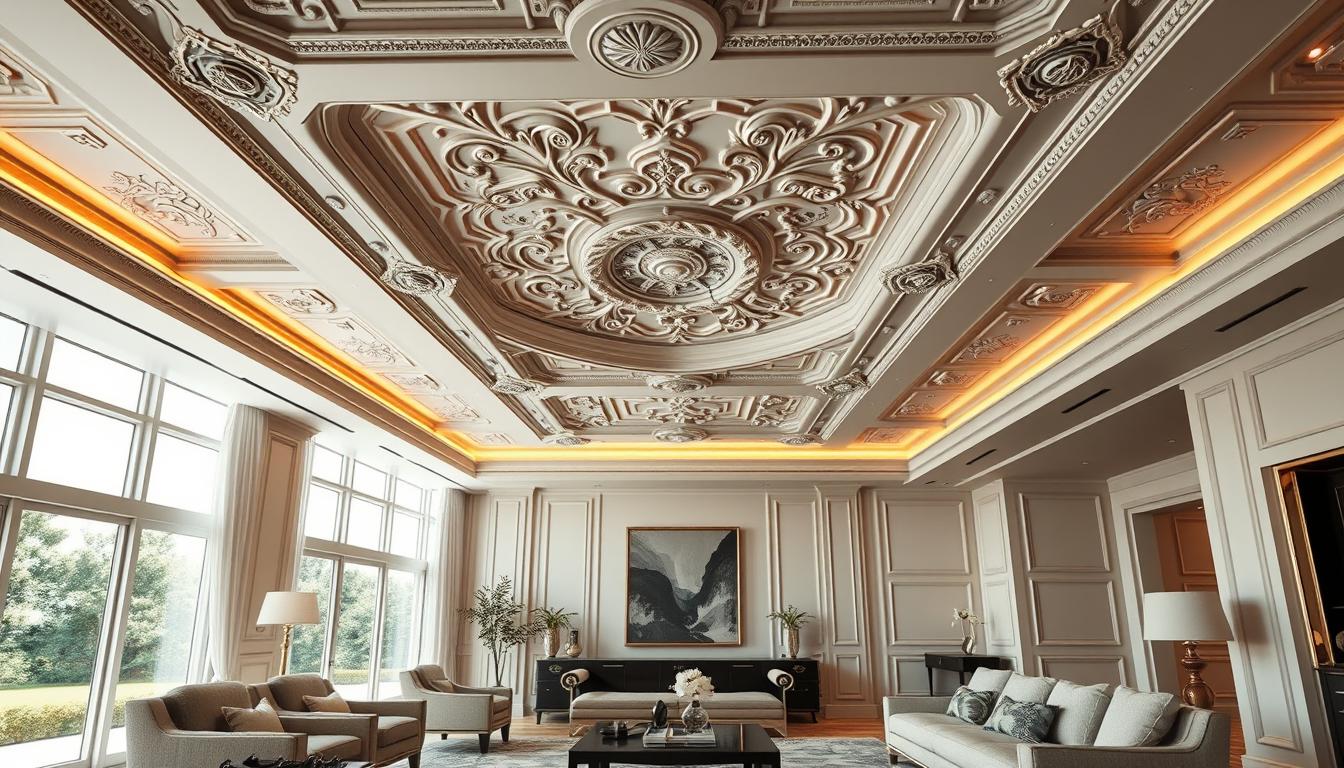Did you know that nearly 40% of homeowners in the United States live in homes that are less than 1,500 square feet?
With the rise of minimalism and efficient living, small home decor has become a big part of home design. We think a small home doesn’t mean you have to give up style for space. In this article, we’ll share the best decorating ideas to make the most of your home. We’ll cover everything from embracing minimalism to changing up your decor with the seasons.
We’ll share practical tips and inspiration to help you give your small home a stylish and functional makeover.
Key Takeaways
- Maximizing space with minimal decor
- Utilizing multi-functional furniture
- Embracing seasonal decor adjustments
- Creating an illusion of more space
- Balancing style and functionality
Embracing Minimalism in Small Spaces
Minimalism can change the game in small spaces. It makes rooms feel open and calm. By choosing only what’s essential, homes become more beautiful and useful.
Understanding Minimalist Design
Minimalist design is all about simplicity and clean lines. It means a space without clutter, focusing on what’s truly needed. This style isn’t just about looks; it makes living easier and less stressful.
Interior design experts say the secret to minimalist design is in the details. Choose a few, quality items that matter, not many that don’t.
Benefits of Minimalism
Minimalism has big benefits, even in small spaces. Key advantages include:
- A sense of openness and spaciousness
- Reduced clutter and stress
- Easier maintenance and cleaning
- A more focused, curated aesthetic
A study found that minimalism makes people feel calmer and more focused. This is because there’s less visual clutter and more focus on what’s important.
| Benefit | Description |
|---|---|
| Openness | Creates a sense of space |
| Reduced Stress | Less clutter, less overwhelm |
| Ease of Maintenance | Fewer items to clean and maintain |
Tips for Minimalist Decor
To get a minimalist look, start by decluttering. Get rid of anything not essential or joyful. Then, pick a few quality pieces that fit your style.
“The ability to simplify means to eliminate the unnecessary so that the necessary may speak.” – Hans Hofmann
For decorating, use the 60-30-10 rule. 60% of the room should be one color, 30% another, and 10% an accent. This creates balance and harmony.
By embracing minimalism, you can make your home beautiful, functional, and peaceful. It’s about making thoughtful design choices that improve your life.
Choosing the Right Color Palette
In small homes, the color palette is key. It’s not just about looks; it’s about making a room feel bigger and cozier. When we think of cozy home decorating ideas, color is often the first thing we consider.
Light Colors for Small Spaces
Light colors are essential in tiny house interior design. They reflect light and make rooms feel larger. Shades of white, beige, or light gray on walls can make a space feel open.
These colors also provide a clean background for furniture and decor. Plus, light colors on ceilings can make them appear higher, adding to the spacious feel. It’s important to choose soft light colors to add warmth.
Using Accent Colors Wisely
While light colors are the base, accent colors add personality and depth. Use accent colors wisely to avoid overwhelming the space. A bold accent wall or vibrant decorative items can draw the eye and create interest.
The trick is to balance accent colors with light colors. For example, a bright throw pillow or artwork can add a pop of color without taking over the room.
Creating Depth with Shades
To add depth in a small space, play with different shades of your color palette. Using varying shades creates a layered look that adds depth and interest. For instance, light walls with darker trim can create a layered effect.
Also, using different shades in furniture and decor can make your space feel cohesive and intentional. This is very effective in tiny house interior design, where space is limited.
By choosing the right color palette and using these techniques, you can make your small home cozy and inviting. It will feel spacious and personalized.
Multi-Functional Furniture Solutions
In the world of small home decor, multi-functional furniture is a big deal. It’s key for interior styling for small spaces. These pieces do more than one thing, cutting down on clutter and making spaces more useful.
Best Furniture Pieces for Small Homes
Choosing furniture for small homes means looking for pieces with many uses. Here are some top picks:
- Ottomans with storage compartments
- Wall-mounted desks that can fold away
- Nesting tables that stack together
- Sofa beds that are both seats and beds
The Importance of Versatile Designs
Versatile designs are crucial for small home decor. Furniture that can change with the situation makes living spaces more flexible. For example, a storage coffee table holds drinks and snacks, and also books and magazines.
Space-Saving Options
To save space, we look for furniture with smart designs. Here are some great choices:
- Drop-leaf tables that expand or contract
- Storage beds with drawers or shelves
- Foldable chairs that hang on walls
Using these multi-functional furniture solutions, we can make small homes efficient, stylish, and cozy.
Utilizing Vertical Space
Using vertical space is a great way to make small homes more functional and pretty. It keeps floors and surfaces clear and adds visual interest.
How to Maximize Wall Space
To make the most of wall space, install shelves, hooks, or storage units that reach the ceiling. This method offers lots of storage and makes ceilings seem higher. Floating shelves are great because they add storage without cluttering the space.
Creative Storage Solutions Up High
Using the top of walls for storage is both useful and stylish. Think about hanging baskets or storage cubes from the ceiling. Wall-mounted cabinets that go up are also good for storing less-used items.
Decorative Wall Features
Vertical space is also perfect for decorative features that make your home look better. You can have gallery walls, large art pieces, or vertical gardens. These add beauty and make your home feel more welcoming.
By using these ideas, you can turn your vertical space into a functional, beautiful, and innovative part of your small home design.
Incorporating Mirrors for Illusion of Space
To make small spaces feel bigger, think about using mirrors. Mirrors can make a room look larger and brighter. They are a key part of decorating small homes.
Types of Mirrors to Use
Not all mirrors work the same for small spaces. Large mirrors or mirrored furniture are best. A big, plain mirror or a mirrored console table works well.
For a softer look, try a group of small mirrors. This adds interest and makes the space seem bigger.
Placement Tips for Maximum Impact
Where you put mirrors matters a lot. Place a mirror opposite a window to reflect light and views. This makes the room feel brighter and more open.
Also, put a mirror opposite a door or at the end of a narrow hallway. This makes the space seem longer or wider, making it feel roomier.
Reflecting Light and Colors
Mirrors do more than just make spaces look bigger. They also reflect light and colors, improving small home decor. By reflecting a colorful wall or artwork, mirrors spread color and make the room feel more spacious.
Plus, mirrors can bounce natural light around the room. This reduces the need for extra lights and makes the space feel more open and airy.
Smart Lighting Choices for Smaller Rooms
Smart lighting can make small rooms look bigger and feel more welcoming. The right lighting can change how we see and enjoy these spaces.
Layering Different Light Sources
Using different light sources is key to a bright and cozy small room. We mix ambient, task, and accent lighting. Ambient lighting lights up the whole room, task lighting helps with activities like reading, and accent lighting shines on special features.
For example, mixing ceiling lights, table lamps, and floor lamps creates a balanced look. LED strip lights can add a modern touch, like under-cabinet lighting.

Using Natural Light Effectively
Using natural light is essential to make small rooms look bigger. Keep windows clear, use sheer curtains, and place mirrors to bounce light. For more ideas, check out our guide on transforming your small home.
Light-colored walls and ceilings also help reflect natural light, making rooms feel larger.
Choosing Appropriate Light Fixtures
Picking the right light fixtures is important for both looks and function. In small rooms, sleek and space-saving fixtures like recessed lighting work best. Think about the light’s color too; warm white is cozy, while cool white makes rooms feel bigger.
Smart lighting is also a great choice for small homes. It’s flexible and can change to fit different needs and moods.
Outfitting Small Rooms with Area Rugs
Area rugs are key in small home decorating. They make rooms look bigger and add warmth. They also bring a cozy feel that makes your home more inviting.
Selecting the Right Size Rug
Choosing the right area rug size is important. A rug that’s too small can make a room feel off. On the other hand, a rug that’s too big can overwhelm it.
Measure your room and furniture to find the perfect rug size. Think about the rug’s shape too. A rectangular rug fits well in rectangular rooms, while a round rug can soften square rooms.
Visual Tricks with Area Rugs
Area rugs can make small rooms look bigger. A light-colored rug can make a room feel more open by reflecting light. A rug with a subtle pattern can also make a room feel larger by creating continuity.
Place a rug to create a clear path in the room. This trick can make the room feel more spacious. Using a rug to define areas in an open-plan space can also help create separate zones without walls.
Layering Rugs with Different Textures
Layering rugs with different textures adds depth and interest. Start with a large, flat rug as the base. Then, add a smaller, textured rug on top.
When layering rugs, think about color and texture. The top rug should have a unique texture, and its colors should match the base rug. This makes your small room feel more personal and welcoming.
Clever Storage Solutions
In small homes, clever storage is key to keeping things tidy. It helps us make the most of our space while keeping our homes looking good.
Concealed Compartments
Using hidden storage ideas is a smart move. It lets us stash things away, making our homes look neat and calm.
For example, ottoman storage or beds with drawers can add lots of space. They do this without sacrificing style or comfort.
Modular Systems
Modular storage units are another great option for small homes. They can be set up to fit any space, offering a personalized storage solution.
These units help us use every corner and nook. This way, we make sure our home is fully utilized.
Baskets and Containers
Baskets and decorative boxes are also important for keeping things organized. They store our stuff and make our rooms look better.
With different baskets and boxes, we can sort our belongings. This makes it easy to find what we need and keeps our space looking nice.
By using these storage ideas together, we can create a space that looks good and works well. This makes our small homes both beautiful and functional.
Personalizing Your Space with Art
Art can turn a small home into a cozy and inviting place. By picking art that shows your personality and style, your home will feel more like you. It will also feel more welcoming.
Choosing Art that Fits
When picking art for your small home, think about what matches your decor. Choose artwork that resonates with you and fits your space’s look. For small homes, it’s better to have a few big pieces than many small ones.
- Match the art’s colors with your room’s colors.
- Make sure the art’s style goes with your furniture and decor.
- Feel free to mix different styles and textures for a unique look.
DIY Art Projects for Small Homes
Making your own art is a fun way to make your space your own. DIY art projects let you create art that fits your home and taste. Here are some ideas to start:
- Use photos or prints of things you love.
- Make a collage with paper, fabric, or found objects.
- Paint or draw in a style that shows who you are.

Arranging Artwork Effectively
How you arrange your art can really change how your space looks and feels. Here are some tips to make your art display look good:
- Put similar pieces together for a cohesive look.
- Try different arrangements until you find one you like.
- Think about the size of your art compared to your furniture and room.
By carefully choosing and arranging your art, you can make your small home look better. It will feel more like your own and more welcoming.
Adapting Decor to Flow Between Rooms
To make your home feel connected, it’s key to match your decor from room to room. This makes your home look better and feel more unified.
Creating a Cohesive Look Across Spaces
For a unified look, pick a design theme and stick to it. Choose a few key elements like furniture style or colors. Then, use them in every room.
For example, picking the same flooring or keeping a consistent style can really help. It makes your home look like one big, beautiful space.
Using Color and Style to Connect Rooms
Color is very important in linking rooms together. Pick colors that work well in each room to create a smooth flow.
Adding accent colors or bold pieces in each room also helps. It makes moving from one room to another feel smooth and natural.
Importance of Open Paths and Layout
A good layout is essential for a spacious, connected home. Keep hallways and doorways clear. Choose furniture that doesn’t block the way between rooms.
| Design Element | Tips for Continuity | Benefits |
|---|---|---|
| Color Palette | Choose a consistent palette across rooms | Creates visual flow and harmony |
| Furniture Style | Select a few core styles and repeat them | Enhances cohesion and sophistication |
| Layout | Maintain open paths and minimal clutter | Improves navigation and sense of space |
By using these tips, you can make your home feel connected and beautiful. It shows off smart, small home design ideas that make your space better.
Using Plants to Enhance Small Spaces
Plants can make small homes feel more welcoming and healthy. By picking the right plants and placing them well, we get the most benefits.
Best Plants for Limited Areas
In small spaces, choose plants that are small or grow well in little light. Some top indoor plants for tight spots include:
- Snake Plant: It purifies the air and grows in low light.
- ZZ Plant: This plant is easy to care for and can handle low light.
- Pothos: It’s flexible and can grow in different light conditions.
Placement Ideas for Maximum Effect
Where you put plants can really make a difference in small spaces. Here are some placement ideas to try:
- Use hanging baskets to save floor space and add visual interest.
- Place plants on high shelves to create a sense of height and draw the eye upward.
- Position plants in corners to fill empty spaces.
Benefits of Greenery in Home Decor
Adding plants to our decor has many benefits, like air purification and stress reduction. They also bring a touch of nature, improving our space’s look.
By choosing and placing plants wisely, we can make our homes more inviting and healthy, even in the smallest spaces.
Seasonal Decor Adjustments
As the seasons change, our homes need a refresh to stay cozy and inviting. A few simple adjustments can keep our space feeling current and reflecting our personal style. We can draw inspiration from apartment decorating to create a beautiful and functional haven.
Refreshing with Simple Swaps
One easy way to update decor is by making simple swaps. For example, switching out throw pillows, blankets, and rugs can instantly change our home’s look. We can also update wall decor by swapping out artwork or adding seasonal pieces, like winter wreaths or summer prints.
Using Small Decor to Refresh Rooms
Small decorative items can have a big impact on refreshing our rooms. Using vases, candle holders, and other decorative accents in seasonal colors or themes can add personality to our space. It’s also a chance to show off our personal style and interests.
Maintaining a Cohesive Look
While updating decor with the seasons is fun, keeping a cohesive look is key. Choosing a few core elements, like a neutral color palette or a statement piece of furniture, helps tie our space together. This way, even as we make seasonal adjustments, our space feels continuous.


